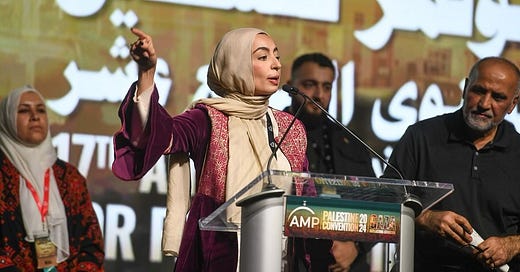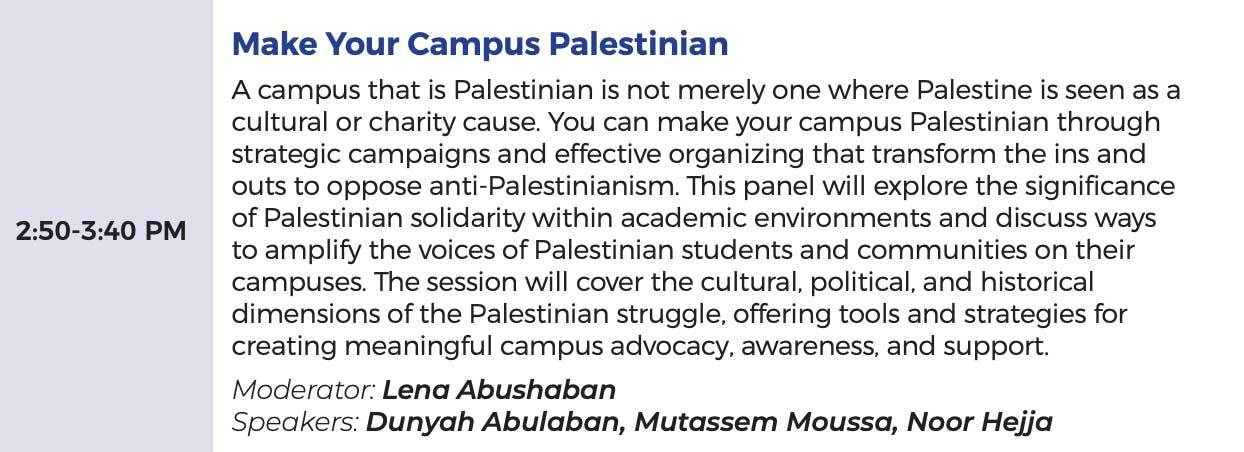
The Free Press

CHICAGO — It’s the day after Thanksgiving, but about 50 American college students are not with their families, or watching football, or trying to snag a Black Friday deal. They’re packed into a conference room in the Chicago suburb of Tinley Park, trying to figure out how they’d handle an Israeli official visiting their campus.
And they’ve turned it into a contest between two teams: females versus males. A woman in a purple hijab, named Jenin Alharithi, is leading the game. She hits the timer on her phone and tells the group they have five minutes to “figure out strategies.”
“A war criminal is coming to your campus,” said Alharithi, a recent graduate of the University of Illinois at Chicago. “What are you going to do?”
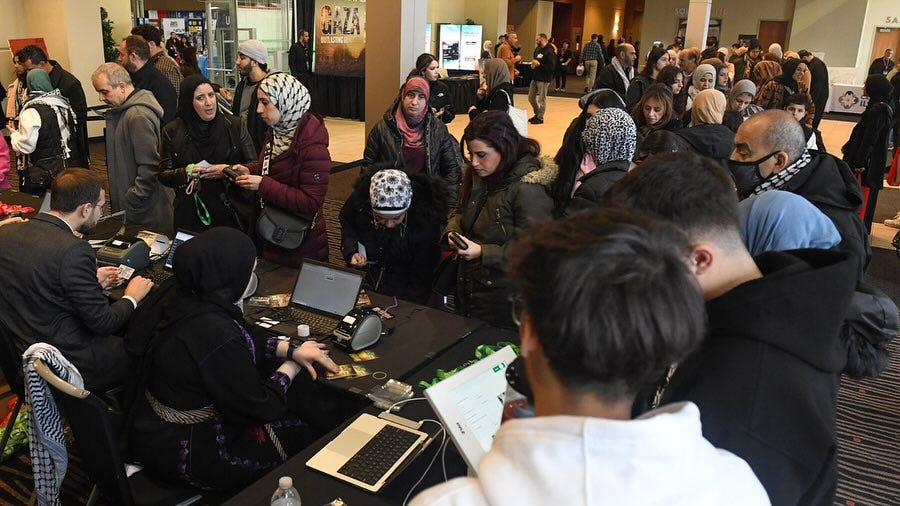
A woman in a green chiffon hijab is the first to speak up, saying the students should form a protest, starting with recruiting demonstrators over the secure messaging app Telegram.
“I think we should demand, like, international justice,” she said, spreading her hands wide as she imagined the words on a poster. “And put ‘emergency rally’ in the school Telegram group.”
Then, a young woman with dark curly hair speaks. She says it is important to deflect any accusations of antisemitism, so she would enlist the group Jewish Voice for Peace (JVP) to join the protest. The Anti-Defamation League calls JVP a “radical” organization “that advocates for the eradication of Zionism and the boycott of Israel.” The group has more than 25 chapters across the country; last spring, Columbia University banned its chapter for using “threatening rhetoric and intimidation” at campus events.
“The first complaint is going to be ‘Oh, this is antisemitic,’ ” the woman explained of the protest. “I think we need like a JVP, or something like that, with Jewish people. We want white people, Jewish students there.”
This exercise, called “Crisis Room,” was part of the programming for college students at the 17th Annual Convention for Palestine—the largest gathering of its kind in the U.S., which was attended by thousands last weekend. The event is hosted by American Muslims for Palestine (AMP), a nonprofit currently facing a House probe over allegations it has “substantial ties to Hamas.” The purpose of the conference, which attracts Palestine supporters from all over the country, is to “galvanize their base,” according to Jon Schanzer, who specializes in Iran-backed terrorism at the Foundation for Defense of Democracies.
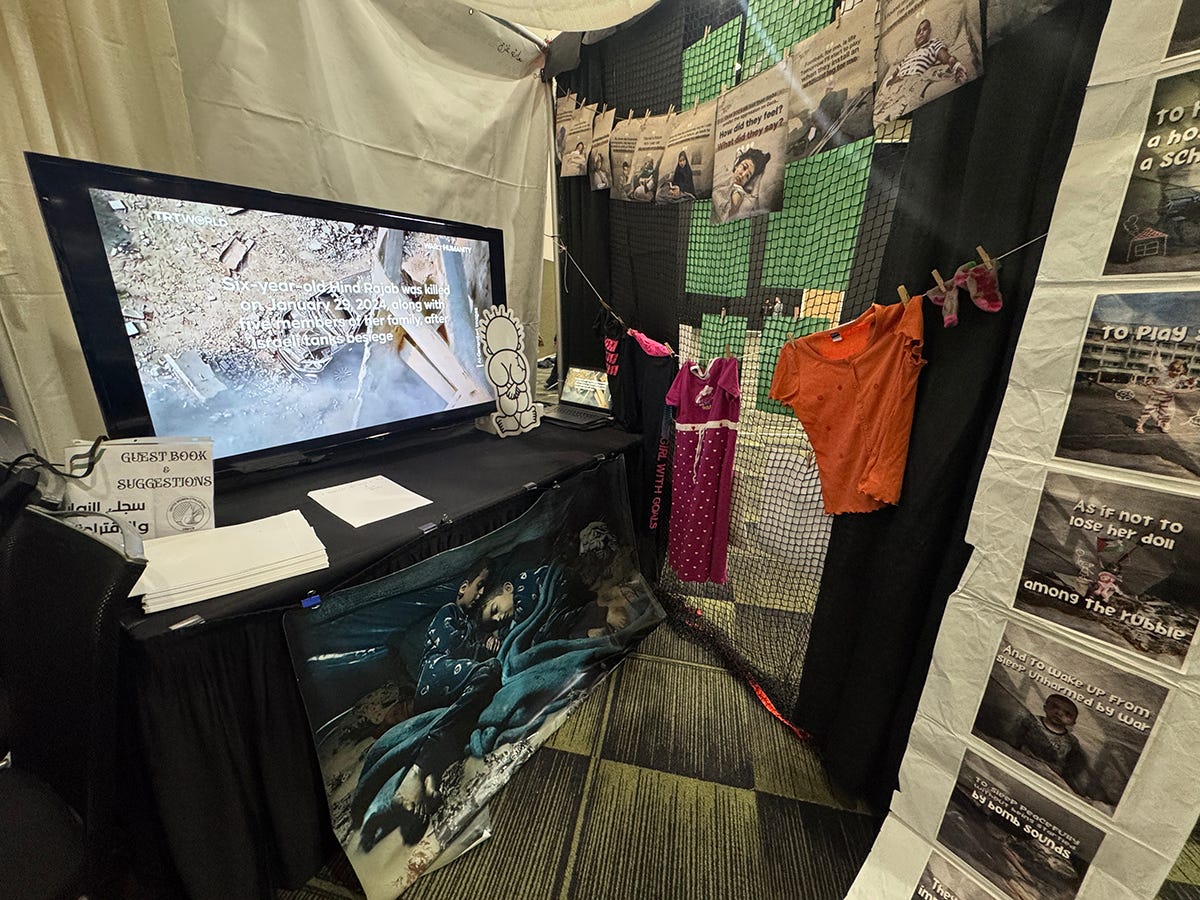
There is evidence that AMP has been helping drive the anti-Israel movement consuming college campuses of late, Schanzer told me. Indeed, the group’s executive director, Osama Abuirshaid, was spotted speaking to student activists last spring at both Columbia and George Washington universities. Abuirshaid, who federal authorities had previously designated as a “known or suspected terrorist,” told Columbia students, “This is not only a genocide that is being committed in Gaza—this is also a war on us here in America.” Less than 48 hours later, he appeared at George Washington’s encampment, telling a crowd of keffiyeh-clad students, “Zionism is no less evil than white supremacy.”
This year’s Convention for Palestine also featured speakers such as AMP board member Salah Sarsour, who was arrested and imprisoned in 1995 by Israel for eight months for supporting Hamas, and Nihad Awad, executive director of the Council on American-Islamic Relations, who last year said he was “happy to see” Hamas carry out its October 7 attack on Israel, which left 1,200 dead.
Schanzer, who testified before Congress in 2016 about AMP, said that over the last decade, the group “has invested a great deal of effort, and from what we can tell, no small amount of money, in cultivating the next generation of activists on behalf of the Palestinian cause.” He added that the group has “done a lot to galvanize people in support of Hamas.”
I bought a two-day ticket to the convention to find out how the movement is prepping American college students for the next wave of anti-Israel protests.
Watch Olivia’s coverage of the event here:
The convention’s programming for college kids is called “Campus Activism Track,” and included sessions on the following:
“Make Your Campus Palestinian,” which taught how to “amplify the voices of Palestinian students and communities” on college campuses. Former student activists, including from Chicago’s DePaul and Loyola universities, shared strategies for how to “oppose anti-Palestinianism.”
A “Know Your Rights” session featured Rifqa Falaneh, a fellow at Palestine Legal who specializes in defending student protesters. Falaneh previously headed DePaul’s chapter of Students for Justice in Palestine, the widely banned campus group that receives financial support from AMP. Also there: Youssef Hasweh, a former University of Chicago student whose degree was initially withheld after he became a prominent participant in his school’s encampment last spring.
“Bringing Activism to Professionalism,” in which students heard speakers describe “how they integrated Palestinian activism into their craft.” Guests included Ashraf Al-Mashharawi, a producer with credits at Al Jazeera as well as a pharmacist, a software engineer, and an English teacher at a nearby public school.
In a session called “In Front of the Lens,” speakers taught college students how to write a press release and handle “tricky questions” from reporters on whether they “support terrorism.” A girl with a keffiyeh covering her head took a stab at answering that question, telling the crowd, “I would say, ‘No, I do not support terrorism,’ and then I would go over the things that Israel does—I would say, ‘I do not support the eviction of innocent Palestinians, I do not support the shooting of Palestinian children.’ ”
She continued: “You don’t want them to put you on the defensive. You have to put them on the defensive.” The student attendees, who were enrolled at Saint Xavier University, DePaul University, Loyola University, and other Midwest colleges, nodded in agreement.
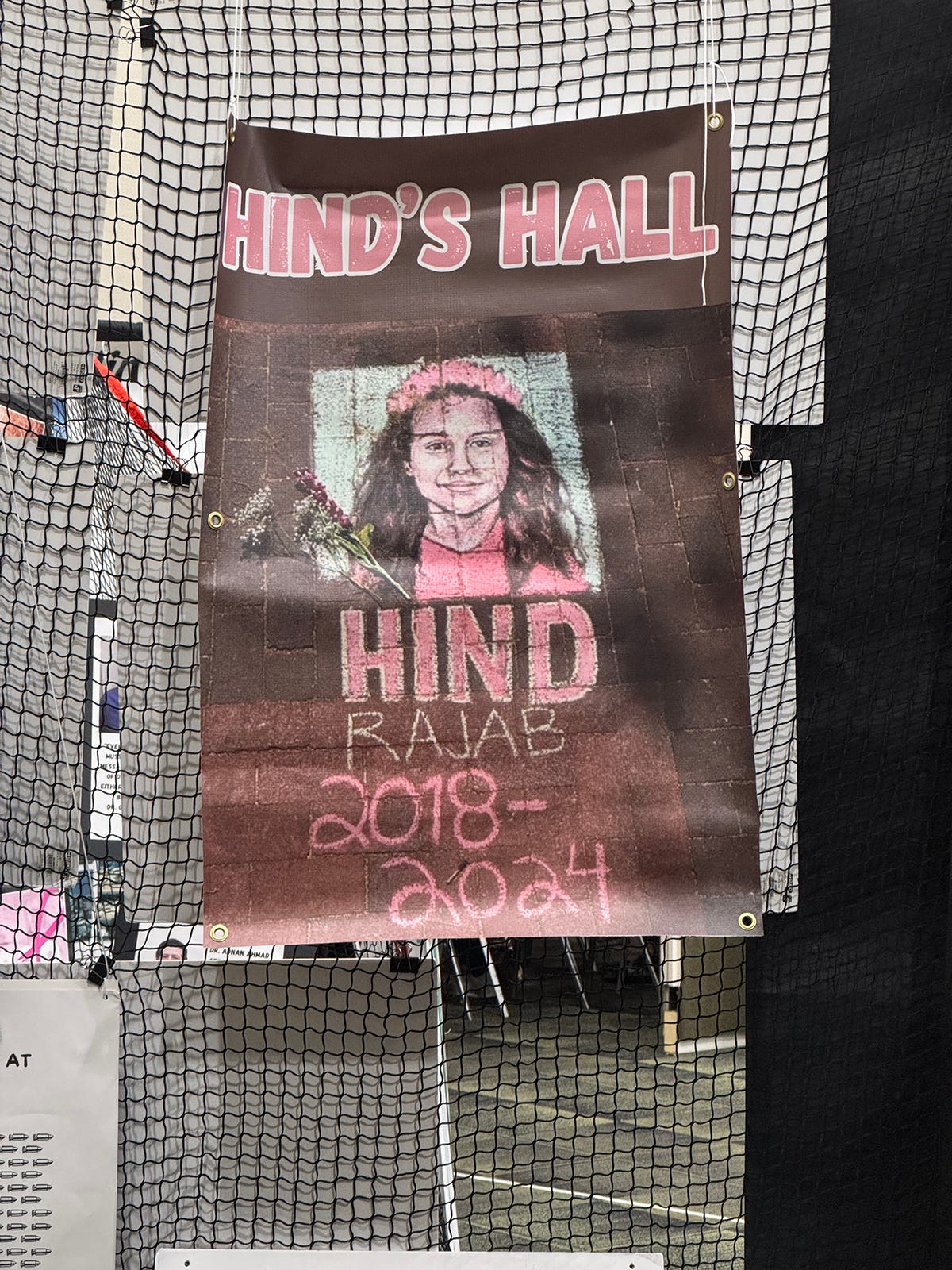
Meanwhile, in a plenary session entitled “Criminalizing Palestine Solidarity: The Age of the New McCarthyism,” Falaneh thanked the young activists in the crowd for their role in pushing the pro-Palestine movement forward.
“They are at the front lines of the liberation movement,” she said of the student protesters. “The students are the ones confronting these neoliberal Zionist institutions.”
Falaneh added that since this past January, her firm Palestine Legal had received more than 900 requests for legal support “related to campus suppression.”
“What these numbers tell you is that while the movement from Palestinian liberation is becoming fiercer, so is the repression,” said Falaneh.
“You know, many people sit around and say what the students are doing—‘May was crazy, April was amazing with the encampments and such. Look at what the students are doing.’ But it’s like, ‘No, my friend, what are you doing? How are you supporting the liberation movement?’ ”
Olivia Reingold is a reporter for The Free Press. Follow her on X @Olivia_Reingold and read her piece “Camping Out at Columbia’s Communist Coachella.”
For more exclusive reports and thoughtful commentary, subscribe to The Free Press:


